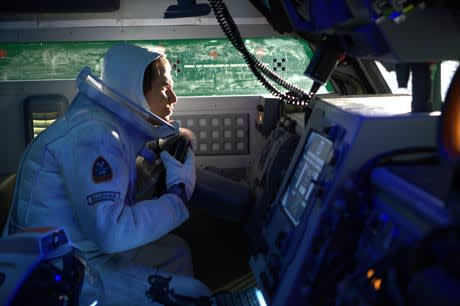In the near future, in the wake of that pesky peak oil predicament we keep hearing so much about, the bulk of earth's energy is provided by the Helium-3, solar energy collected in rocks on the dark side of the moon and harvested to produce clean-burning fission fuel. Sam Bell (Sam Rockwell) mans the Lunar Corporation's mostly automated orbital mining operation, a largely inactive gig that leaves him plenty of time to whittle, work out, cultivate a scraggly beard and make small talk with his sentient robotic assistant (Kevin Spacey). With two weeks left on his three-year contract, Sam's eagerness to quit his solitary surroundings and return home to his wife and daughter is mounting. Cue Solaris-styled hallucinations, which send the already psychologically delicate Sam over the edge, culminating in a mishap with one of the lunar mining vehicles.
With Moon, director Duncan Jones is quite diligently working to pay homage to the more sparse sci-fi dystopias of his youth, from Peter Hyams' Outland (the extraterrestrial mining operation shtick) to John Carpenter's Dark Star and Kubrick's 2001 (Spacey's GERDY is rather obviously a morally rewired HAL 9000, right down to the sedate refrains of "I can't let you do that, Sam"). The crucial difference, however, is that in those films stuff actually happens. In Moon, Jones seems more content to loft a cause célèbre critique of corporate responsibility out of the atmosphere, cobbling together a heavy-handed ethical agenda that is as routine as the film's fairly predictable twists. While Rockwell is wonderfully twitchy in a performance that requires him to play with nothing, and Clint Mansell's characteristically sparse soundtrack perfectly complements the film's isolationist set-dressing, Moon fails to seize on the opportunities offered by its initially intriguing high concept.
(Sony Pictures Classic)With Moon, director Duncan Jones is quite diligently working to pay homage to the more sparse sci-fi dystopias of his youth, from Peter Hyams' Outland (the extraterrestrial mining operation shtick) to John Carpenter's Dark Star and Kubrick's 2001 (Spacey's GERDY is rather obviously a morally rewired HAL 9000, right down to the sedate refrains of "I can't let you do that, Sam"). The crucial difference, however, is that in those films stuff actually happens. In Moon, Jones seems more content to loft a cause célèbre critique of corporate responsibility out of the atmosphere, cobbling together a heavy-handed ethical agenda that is as routine as the film's fairly predictable twists. While Rockwell is wonderfully twitchy in a performance that requires him to play with nothing, and Clint Mansell's characteristically sparse soundtrack perfectly complements the film's isolationist set-dressing, Moon fails to seize on the opportunities offered by its initially intriguing high concept.
